Andrew Fagan reveals Crows looked at 25 locations prior to selecting aquatic centre for new base
It has been a tough year for the Adelaide Crows, yet there’s a sense of optimism around a new coach and potentially a new base. Here, Graham Cornes chats with Andrew Fagan to get all the ins and outs at West Lakes.
AFL
Don't miss out on the headlines from AFL. Followed categories will be added to My News.
- Crouch wants to stay - if the money is right
- How to get the most out of your Advertiser digital subscription
It has been a tumultuous year for the Adelaide Football Club.
Disappointing on-field performances saw the demise of senior coach Don Pyke whose honourable, but unexpected resignation created further tumult at West Lakes.
The much publicised review exposed other areas of concern within the football department with the result that head of football, Brett Burton and senior assistant coach, Scott Camporeale were terminated.
Stream over 50 sports Live & On-Demand with KAYO SPORTS on your TV, computer, mobile or tablet. Just $25/month, no lock-in contract. Get your 14-day free trial and start streaming instantly >
However, the appointment of Matthew Nicks as senior coach and the anticipated move away from West Lakes have energised the club.
Just two days after the club had been given the green light to pursue the feasibility of establishing a new training and administrative centre at North Adelaide, chief executive, Andrew Fagan sat down with me for a conversation of the club’s current status.
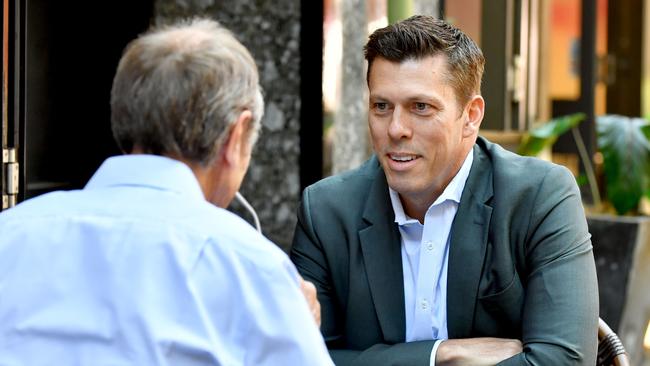
Graham Cornes: You’ve been pretty busy lately, how are you handling it all?
Andrew Fagan: It’s been really busy, but it’s been good.
The way this industry now works, there’s almost no time for a break so I’m looking forward to Christmas when the industry shuts down.
The way the AFL structures the year; in-season, post season, trade period, the draft, AFLW and AFL pre-season, together with our own reviews and planning, it definitely keeps us focused.
On top of that, we are working through our new commercial programs with our sponsors and others, renewing our members, looking at all our fan engagement activity, planning match days and other events.
You throw in a potential development opportunity and it starts to get pretty busy.
But it’s great, I love it.
Graham Cornes: Let’s talk about that, you’ve got some kind of go ahead from the council to develop the new club rooms and facility in North Adelaide, can you tell us how and when that process started?
Andrew Fagan: Well, the formal part of the process started in February this year –
Graham Cornes (interrupting): But years ago someone must have said: Let’s look for a new site.
Andrew Fagan: In that respect it started probably about two years or so ago.
We’ve got a lease until 2048 at West Lakes and facilities over there are okay but obviously the broader precinct has become a development site and will remain that way for some time so the end result isn’t ideal.
Although, we weren’t in an immediate rush, we just thought it was good due diligence to start looking, so we embarked on a process to assess potential options so that we were prepared in the event that an opportunity arose.
Through that process we identified the Adelaide Aquatic Centre, a facility that was presenting the council with some significant challenges.
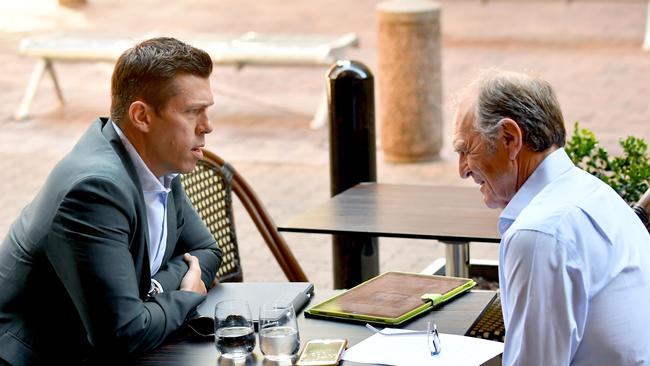
Graham Cornes: Were there other sites that you looked at?
Andrew Fagan: Yes, we initially identified around 25 sites. We refined some assessment criteria and began to narrow them down. 25 became 15 which became eight and eight became three.
Graham Cornes: Tell us what the others were.
Andrew Fagan: I don’t think I should reveal that.
We then formally connected with the City of Adelaide and said ‘here are a couple of sites we’ve looked at, we understand you have some issues with the Adelaide Aquatic Centre, we’d just like to see if we can explore those with you and see if there might be an opportunity for us to take a look at establishing a facility on that site that might solve some problems for you and create an opportunity for the community as well as the football club’.
They had just launched an unsolicited bid process, a new policy that enabled organisations to present council with plans that might provide a benefit to the community.
That process started in February this year and earlier this week we had the opportunity to present against the guiding principles that council had provided us.
We feel it still remains a really compelling opportunity, so we were happy to A, present them; and B, for the first time to be able to speak publicly about them because to date we’d been restricted in our ability to do that because of the nature of the process.
Graham Cornes: So you’ve been given the go ahead to go to public consultation, so what happens now?
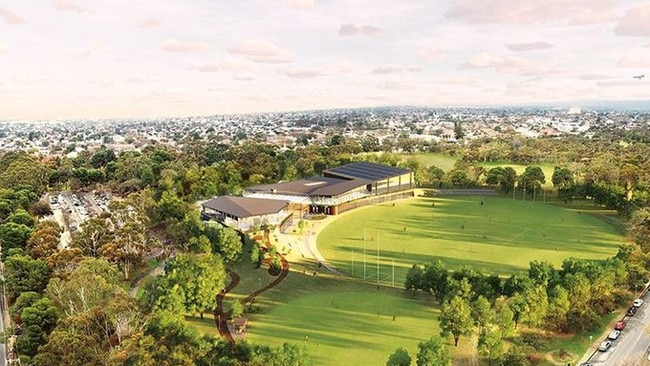
Andrew Fagan: The next phase is a council-lead, public consultation.
It will look at a couple of things.
One is their own needs analysis as they still have to determine what services they would like in a future aquatic centre.
Concurrent with that there’s some consultation around how we’ve addressed the guiding principles.
We look forward to getting community feedback on that.
With that feedback and some further work we’re able to do some of the fun stuff, financial modelling and business planning, as well as get pretty granular on the designs themselves.
Graham Cornes: We heard the figures bandied around – $60 million – $15 million dollars from the Australian Government – whether that’s right or wrong.
Now you don’t pay anything down at West Lakes. How are you going to fund the other $45-50 million?
Andrew Fagan: The number can be a bit misleading because ultimately a key part of the equation is an aquatic centre that is yet to be scoped, and that’s subject to the council’s own needs analysis.
So depending on where that lands, it will obviously determine the overall investment that is required for the precinct.
You are right, earlier in the year we did receive $15 million from the Federal Government to contribute towards a new facility for the Crows.
As we move through this next phase, one of the core pieces of work is to pull together the remaining elements of the funding package and those sources are varied.
Traditionally, they will include the AFL as a contributor.
We will either fund, finance or fundraise a component piece as well and we’ve still got value left in the lease at West Lakes, that runs into 2048 at our facility.
Graham Cornes: You’d pass that onto somebody?
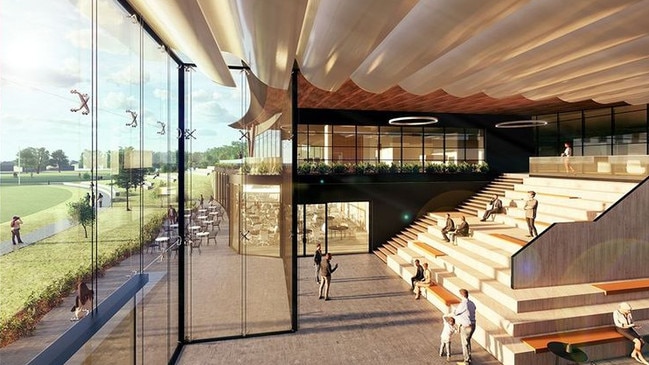
Andrew Fagan: Well there’s a value in it.
Graham Cornes: There’s some value in the remaining 29 years?
Andrew Fagan: There’s value in a lease that runs until 2048.
There are also a variety of other funding solutions.
And State Governments are also often contributors to community and sporting facilities.
Graham Cornes: They all seem barrack for Port Adelaide.
Andrew Fagan: You never know, you never know.
Graham Cornes: The plans that I’ve seen are very basic and the illustrations and photos show just one pool.
Can you replace what’s actually out there at the aquatic centre?
You’ve got a pool, you’ve got diving towers.
There’s four or five different pools out there. How many pools do your plans indicate?
Andrew Fagan: The illustrations that have been provided aren’t meant to be comprehensive. They’re indicative only to illustrate that there’s an aquatic centre there.
Ultimately that’s the role of the council-run needs analysis, which is the exact process they’re working through at the moment.
I think there’s seven hundred odd thousand visitations annually to the existing facility.
They’re having to determine whether they wish to create a facility that can service a similar number of visitations-
Graham Cornes: So it’s up to the council what facilities they want in it.
If they say they want a diving pool, you’ve got to have a diving pool?
Andrew Fagan: Ultimately this becomes a partnership, Graham.
We’re a stakeholder in this project.
It’s not ours alone.
So they’ve got to determine what they want a facility to look like.
It could be a similar size, providing similar services to the to the current one with similar levels of amenity.
It could be larger, it could be smaller.
Ultimately they’ve got to determine what they wish.
This will impact the overall cost of the facility.
It will also need to consider who it’s there to service, whether it’s more localised focused on the residents or ratepayers of the City of Adelaide, who represent around 10 per cent of the users, or more regional.
But at its core, the objective is for it to have lap swimming, hydrotherapy, learn to swim, kids water-play area, a community gymnasium and fitness centre and other dry fitness areas.
But that is a council led decision.
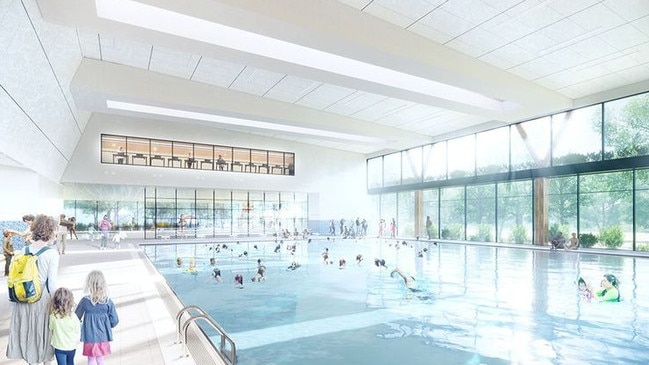
Graham Cornes: You’d have to have a water-polo pool, won’t you?
Andrew Fagan: Again, it’s not our decision.
It is their needs analysis and we’re not designing the services to be included in the facility. That’s 100 per cent for the council to determine.
Graham Cornes: Who’s going to operate it? What’s the business plan? Who operates the aquatic centre?
Andrew Fagan: Again, it is a little cart before the horse to be discussing those things at the moment because the simple fact is it hasn’t been determined.
We’re out to the initial stages of public consultation around our response to the council’s guiding principles.
The council is determining the scope and scale of what a potential new aquatic centre will look like.
Only at that point of time can you really do two important pieces of work.
The first being what’s the overall funding package required to build it, how will be raise that and who will contribute to that.
The second part being, what are the underpinning operational models that would then be put in place to run it.
We don’t have traditional expertise in running an aquatic centre, there are private operators who do; and the council’s been doing it for some time.
There’s an open conversation to be had about it. We are open-minded.
Graham Cornes: The council has a reputation for being obstructive and dysfunctional at times.
Would you be happy to operate in partnership with the council?
Andrew Fagan: I have found my engagement to date with the council to be really positive, albeit limited to the scope of the bid process.
But they’ve been good to deal with.
What is clear, however, is that there are plenty of examples around the country of sporting organisations and/or community organisations working in partnership with local and state governments to run centres similar to this and they do so as true partners.
They do so to not just deliver against their own objectives, but for the benefit of the community more broadly and for the collective partnership.
Graham Cornes: The opinion polls have been positive. You get the negative comments of course but the polls seem to be two thirds in favour of the new development.
Do you feel the pressure to have a facility where members can meet, mingle, entertain, go back after the game?
Andrew Fagan: One of the things that was really important for us – to broaden that question – is how in any new facility can we create a new environment where our members and fans can engage with us as often as possible.
I know we’ve often talked about the Shed and the opportunity that provided for us post-match in the past but we want to take a far broader lens to it.
When we started looking at this site, we quickly eliminated proposing any licenced facilities as part of the precinct.
But for our fans this site provides a lot of other opportunities.
We can create an environment where for 52 weeks of the year if you’re a fan or a member of the club you can come up, grab a sandwich, grab a refreshment, watch training.
Graham Cornes: It won’t be licenced?
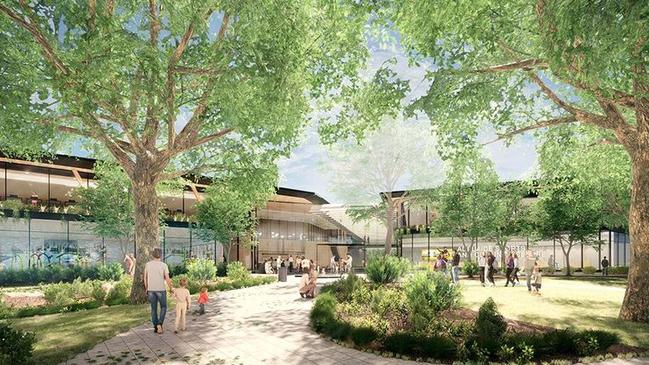
Andrew Fagan: It won’t be licenced, but you can grab a drink, some food, go and kick the footy around with your son or daughter, your brother or dad.
Graham Cornes: Just to clarify, there’s no fences?
Andrew Fagan: No fences.
Graham Cornes: I can go down in the middle of the day with my sons or daughters and have a kick on the same oval that Tex Walker’s practising his goalkicking?
Andrew Fagan: Correct, correct, correct.
For us, that was 100 per cent important.
We think that it’s transformational in that regard for Crows fans to be able to come down at any day of the week and be a part of their footy club.
They can view the memorabilia, engage through the sensory displays that will highlight the heritage of the football club, past players, historic moments.
They can watch the players of today train, have a kick on the oval before or afterwards as well as mingle with players and other people in the club.
We think with a 365 days of the year focus, that presents a wonderful opportunity, particularly as part of a broader sports and community precinct.
Maybe some of those users of the aquatic facility, who aren’t yet Crows fans could become engaged with the club.
When it comes to a licenced club, when it comes to having a schnitzel and a beer, we’re a couple of hundred metres from the top of O’Connell Street, the street that links effectively this site with Adelaide Oval.
I think there will be plenty of opportunities; in fact we will be actively engaging with licensed providers on O’Connell Street to create, not just post-game day experiences, but the ability to connect with past and present players on a far more regular basis.
Graham Cornes: You mentioned on radio this morning, the Le Cornu site.
Andrew Fagan: No I didn’t.
Graham Cornes: I’m sure I read that. So you’re not looking at the Le Cornu site?
Andrew Fagan: No.
Perhaps someone made an assumption that I was referencing that site when I referred to O’Connell Street.
We’ve not engaged directly with any developer or existing licence provider because the process we’ve been going through with the council has meant that we haven’t yet been able to engage more broadly.
But we look forward to looking at all options.
Graham Cornes: Apart from existing facilities like pubs and restaurants, are you examining or looking at developing your own licensed premises?
Andrew Fagan: Not at this stage.
Across the industry you see clubs moving away from licensed premises.
There are far more clubs exiting gaming and licensed premises than there are entering them.
I think a more likely path at this stage is that through partnership with existing providers, we can create an environment where there will be activities on a regular basis where fans can do things like meet the inaugural coach of the Crows and have a chat.
You’d like that!
We think that’s exciting.
One of the by products of that activity would be playing our part in investing into an encouraging activity on O’Connell Street.
It’s a retail street that I’m sure would benefit from any additional focus.
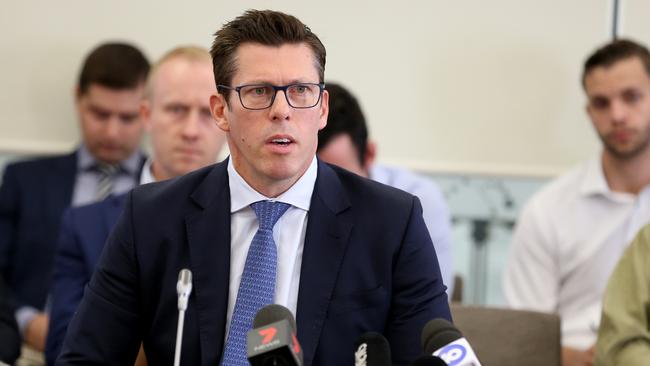
Graham Cornes: How much pressure do you feel to make this project succeed?
Andrew Fagan: When you’re in my role – any club CEO role – the pressure just comes with the job.
Having great facilities is important for footy clubs so you want to make it work.
I’m passionate about the footy club and I think this project could be really transformational for the club and its fans.
So to that extent I’d love for it to work and I’ll do everything possible for that occur.
But we’re at the start of the process, there’s a lot of work to be done.
Graham Cornes: Could you put a timeline on it? Could you guesstimate when it will be up and running?
Andrew Fagan: I think I’d like to suggest through 2020 we’d finalise a position on whether the project will go through or not.
And then it’s probably a two-year build time.
So if everything worked then it could be in place in 2023.
Graham Cornes: It’s been a tough year.
How much responsibility do you feel for the year that was?
You had the disappointment on the field.
You had the constant criticism and speculation – people calling for heads to go – whether it be Chappy, yourself, Brett Burton, Scott Camporeale, Don Pyke – how did you handle that?
Andrew Fagan: It’s been one of the tougher years, there’s no doubt about that.
If you’re the CEO of a footy club or indeed any other large business, you do feel pressure every day.
With respect to my role, there’s an obligation to drive performance right across the football club, both on and off field.
Every day you get up and try to passionately deliver against those objectives.
There are times when you have really good days and there are times when you’re really challenged by it.
I hate losing.
Graham Cornes: Did anything from the review surprise you?
Andrew Fagan: No, there really wasn’t anything that surprised me as such.
I actually wrote for myself some observations pre-review to see whether the independent review would be consistent with what I thought would come out.
Graham Cornes: You sat on the review.
Andrew Fagan: Elements, I was there for part of it.
Graham Cornes: You didn’t guide some of the outcomes, did you?
Andrew Fagan: No, no, no.
I didn’t ask questions.
I was there just as an observer for part of some of the sessions, at the request of Jason Dunstall.
It was important for context.
But things were mostly consistent with what I thought pre-review.
But let’s be clear about why we did the review.
The primary reason wasn’t necessarily because we hadn’t identified what the issues were.
It was primarily to ensure that two thing occurred.
The first was that nothing was left uncovered.
So we wanted the entire playing group and the entire football department staff and other key individuals, to all have the opportunity to contribute.
The independent nature of it ensured that they could speak fully and frankly and confidentially.
So that was important.
You would like to think that none of those things would surprise you, and 99 per cent did not.
There were probably just some areas where maybe the breadth and depth of the issues among certain cohorts were either not as significant or slightly more significant than we thought they might be.
You only get to assess this when you speak with each and every person through a process such as this.
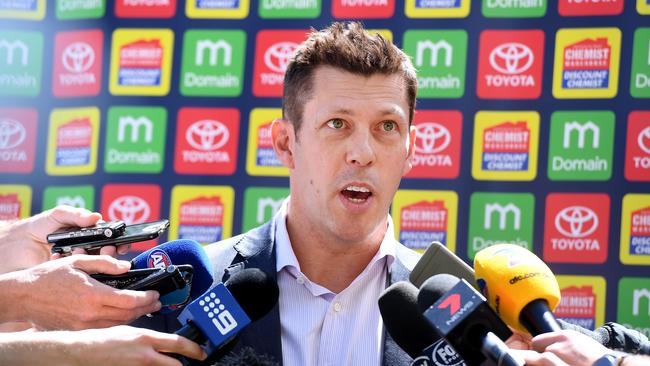
Graham Cornes: Can you give an example of that?
Andrew Fagan: (Long pause)….One of the examples was the extent to which people were feeling pressure and how it was impacting the way in which they were coming to the club every day.
Whether that was players or staff, some were genuinely feeling the pressure of the environment.
They weren’t enjoying it.
As the leader you often become used to that because you are at the front of it, whether it’s the coach, the captain, the chairman or the CEO.
Through the review it was clear that a lot of people were feeling that pressure and it didn’t matter if you were a regular part of the AFL team or not.
There were others as well.
In Adelaide you can’t escape that scrutiny – the team and the sport is covered more than anywhere.
So the extent of that was slightly more significant than I thought it might be it terms of the impact it had on some individuals.
Graham Cornes: There was so much public opinion, it’s hard to separate fact from innuendo, but I had the feeling that Brett Burton and Scott Camporeale were made the scapegoats.
Andrew Fagan: It was really tough and not particularly straightforward.
It’s a high performance industry and for the last 12 months, if you look across all 18 clubs there have been probably 30 or 40 changes of personnel at various levels, coaching, high performance, administration right across the AFL.
It’s a constant in our industry. It’s tough on people.
We had underperformed for a couple of years within our footy department – we know that.
It would be inappropriate for anyone to identify individuals who are no longer part of the club as being the sole source of the problems within the club.
That’s just not correct.
Sometimes you do just get to a point where you need to make some change in order to improve the operations of a department.
Obviously Don Pyke left – primarily in recognition that he thought that change was required. Not that he thought he wasn’t good at his job; not that he thought he couldn’t do a great job.
He is a great coach.
He left because he thought that changes were required in order for us to reboot.
Some other changes that were club made were probably in a similar vein.
Scott and Brett are very good people and good operators, but some changes were needed to reboot.
Graham Cornes: To that end I have heard that Brett Burton was challenging the reasons for his dismissal.
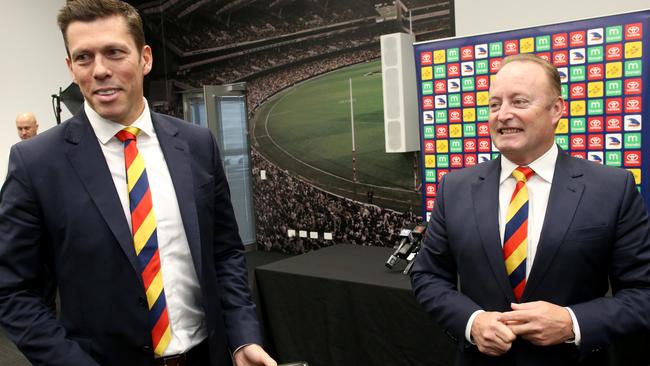
Andrew Fagan: They are always tough conversations and often people won’t agree.
But those matters are always confidential.
Graham Cornes: Is that a yes?
Andrew Fagan: Graham, confidential is confidential. I have the utmost respect for Brett as past player, high performance expert and sports administrator.
Graham Cornes: Moving on. Why has it taken so long to find a head of football?
Andrew Fagan: The simple answer is that we just weren’t in a rush.
We wanted to do a couple of things.
The first is that we wanted to explore a whole lot of options.
Given that we had just made the appointment of the senior coach, we wanted to take some time for Matthew to settle in and look at what the dynamic was going to be like.
You rarely get an opportunity to effectively put a team together at almost the same time.
We want to get the mix right.
A lot of work had already been put into the program planning and preparation right up until Christmas so we weren’t in a rush to make a call.
We have spoken to countless individuals about their interest in the role, but we have also targeted conversations with a range of individuals about candidates.
Some have had up to 25 reference checks on them. It’s been a thorough process.
Graham Cornes: Is that Craig Vozzo?
Andrew Fagan: Craig is contracted to West Coast.
He is a good guy and I enjoy working with him on the AFL Competition Committee.
But I’m not going to go through names.
As we have narrowed our focus the number of conversations multiplies.
The candidates might speak with different people throughout our organisation to gain different perspectives.
People often view a recruitment process as: identify five people, form a panel, conduct an interview and make an appointment.
That can work, but if you have an opportunity to take some time, to add layers of context and background, to test and probe all areas, to work out who would best support Matthew in developing the culture he is building, then you hopefully make a more informed decision.
You don’t always have the chance but we felt we did.
Certainly one of the leading candidates has been one of the first that we engaged with.
Graham Cornes: Do you have to wait for a current contract to expire?
Andrew Fagan: It’s got nothing to do with an existing role, we haven’t been forced to have a delay.
It’s just been a process we’ve been working through.
We’ll make the appointment between now and Christmas.
We’re just going through our final checks.
Graham Cornes: So that’s a matter of days?
Andrew Fagan: Yeah. Probably next week.
Graham Cornes: You should’ve said that the first time!
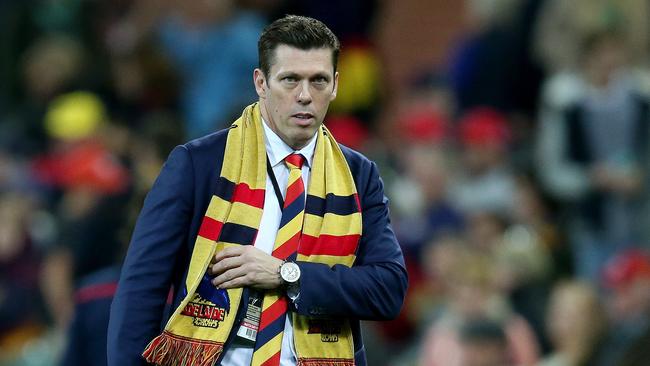
Andrew Fagan: I should have!
People said the same thing about the senior coach appointment.
Why are you taking your time?
Because you want to try and make the right decision.
It’s not about making a quick decision but trying to get it right.
Graham Cornes: One more question, A lot of supporters are asking why are we running baseball teams and Esport teams and not sticking to running a footy club?
Andrew Fagan: The simple response is in order to provide as much certainty as possible for the footy operations and to invest back into our members, fan experience etc, in the short, medium and long term, we need to be as financially stable as we possibly can be.
Sourcing and servicing additional sponsors in a traditional sense takes similar time to running these other businesses.
However, these other opportunities provide new growth potential as well as a range of other benefits.
Graham Cornes: You’re making money out of baseball?
Andrew Fagan: Yes.
Graham Cornes: You’re making money out of Esports?
Andrew Fagan: Yes, with Esports and baseball.
Both are cash positive and are assets worth more than what we acquired them for.
Both have enabled us to expand.
For example, Baseball Australia contract us to run their financial back office.
We’re also running international baseball camps out of Asia.
In Esports they’ve actually become an important part of some of our traditional sponsorship conversations – for example, Optus are a major partner of the football club and the Crows, but were also very keen to use us as a platform to invest in the Esports.
It helped to differentiate us in a really competitive marketplace.
It’s important for our fans to know that the reason were doing it is to ensure we’re financially stable.
Some clubs do that through poker machines, some clubs do it through seeking to go into international markets; and some clubs invest in running aquatic and leisure businesses like Richmond have done.
Collingwood have a netball team.
It’s becoming more commonplace in the AFL but it’s been commonplace in global sport for some time.
Graham Cornes: Last question. You’re about to go into you’re end-of-year performance review?
Andrew Fagan: Yeah, how am I going to go?
Graham Cornes: Now I’m going to ask you. Are you nervous?
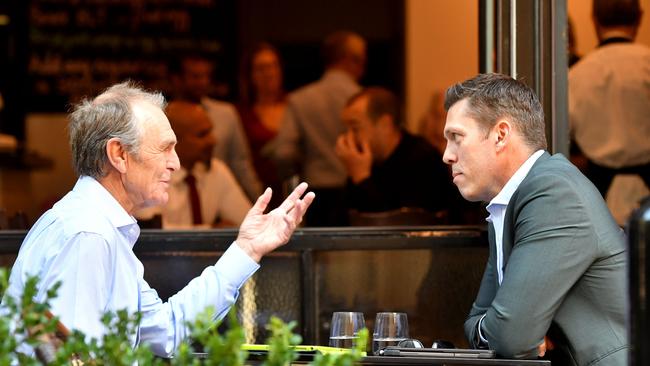
Andrew Fagan: No.
The great thing about my chairman is you get feedback throughout the year, so it’s a no surprises approach to performance management.
He’s an experienced director and has been an incredibly strong leader for club over the last 12 years.
Graham Cornes: You’re under all sorts of pressure though because the chatter when things go bad, ‘the chairman has got to go, the chief executive has got to go, the coach has got to go’.
Andrew Fagan: We all recognise that it’s a high performance business and we share a good portion of responsibility for the performance of the club; the entire operations of the club, on field and off field across the men’s and women’s programs and everything in between.
We also recognise that the club has been around for 30 years and it’ll be around for another 130 years.
We’ll be but a small part in its history but in the time that we’re here we will give it our very, very best.
From my perspective I love this football club, I’m deeply passionate about it and want to make it the very best that it can be, both on field and off field.
And deliver against the expectations of the world’s most passionate sports fans.
Graham Cornes: Are we that?
Andrew Fagan: I think we are.
We’re certainly the country’s most passionate sports fans by some of the research out there.
And from the feedback we receive!
I love the passion.
For me, a personal mantra in life is that I want to be so passionate about my job that as soon as I wake, I want to rush into the club and get going.
I do exactly that.
And I want to be so passionate about my family that at the end of the day I want to rush home to see Alana and my girls.
I do that as well.
In my time here, I want to make the place the best it can be.
Graham Cornes: At least your kids are South Australian.
Andrew Fagan: Well I was born here, don’t forget that.
But the kids are very much South Australian and my two older girls in Canberra are Crows supporters and proudly wear their hats and beanies and scarfs to school sports days.
They fly the flag passionately.
Graham Cornes: Mate thanks for the chat – good luck for next year.
Andrew Fagan: Good on you. Thanks mate.
